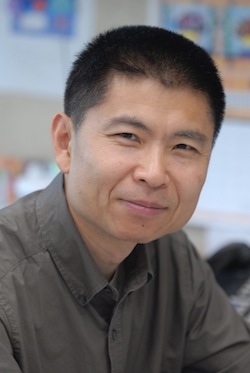
Date:
Location:
Title:
abstract
Ions are essential in physical chemistry, colloidal science, electrochemistry, biology and many other areas of science and engineering. While their role is commonly described in terms of screening and translational entropy, many phenomena, ranging from some classical experimental observations made many decades ago to some new systems of current interest, cannot be explained, even qualitatively, by these concepts. A key effect that is often ignored or inadequately treated in the main literature on electrolytes and polyelectrolytes is the self-energy of the ions. In this talk, I will discuss several self-energy effects in macromolecular and interfacial systems. First, we show that the preferential solvation energy of the ions provides a significant driving force for phase separation. This concept is used to develop a theory to explain the dramatic shift in the order-disorder transition temperature in PEO-PS diblock copolymers upon the addition of salt. Second, we show that the dielectric contrast between the polymer backbone and the solvent significantly affects the conformation and charge condensation in dilute polyelectrolyte solutions. Third, we show that the image force has qualitative effects on the double layer structure and forces, such as like charge attraction and charge inversion. Finally we present a simple theory for treating charge correlation effects in polyelectrolyte solutions that self-consistently account for the conformation changes of the polyelectrolyte chains.
bio
Zhen-Gang Wang is the Lawrence A. Hanson Jr. Professor of Chemical Engineering at the California Institute of Technology. He received his bachelor’s degree in Chemistry from Beijing (Peking) University in 1982, and his Ph. D in Chemistry from the University of Chicago where he worked with Stuart Rice and Karl Freed. He then worked as a postdoctoral fellow first in Exxon Research and Engineering Company, with Sam Safran and Tom Witten, and then at UCLA with Bill Gelbart. Since 1991 he has been on the Chemical Engineering faculty at Caltech.
Zhen-Gang Wang’s research is the theoretical and computational study of structures, phase behavior, interfacial properties and dynamics of polymers, soft materials, and biophysical systems. His current activities revolve around three main themes: charged systems, nucleation or more generally barrier crossing, and nonlinear rheology of polymers gels and entangled polymers.
Zhen-Gang Wang was a recipient of the Henry and Camille Dreyfus New Faculty Award, the Camille Dreyfus Teacher-Scholar Award, and the Alfred P. Sloan Award; he was elected a Fellow of American Physical Society in 2001; and in 2008 he was awarded the Richard P. Feynman Prize for Excellence in Teaching at Caltech.
Hosted by Phil Pincus. Download event flyer.



